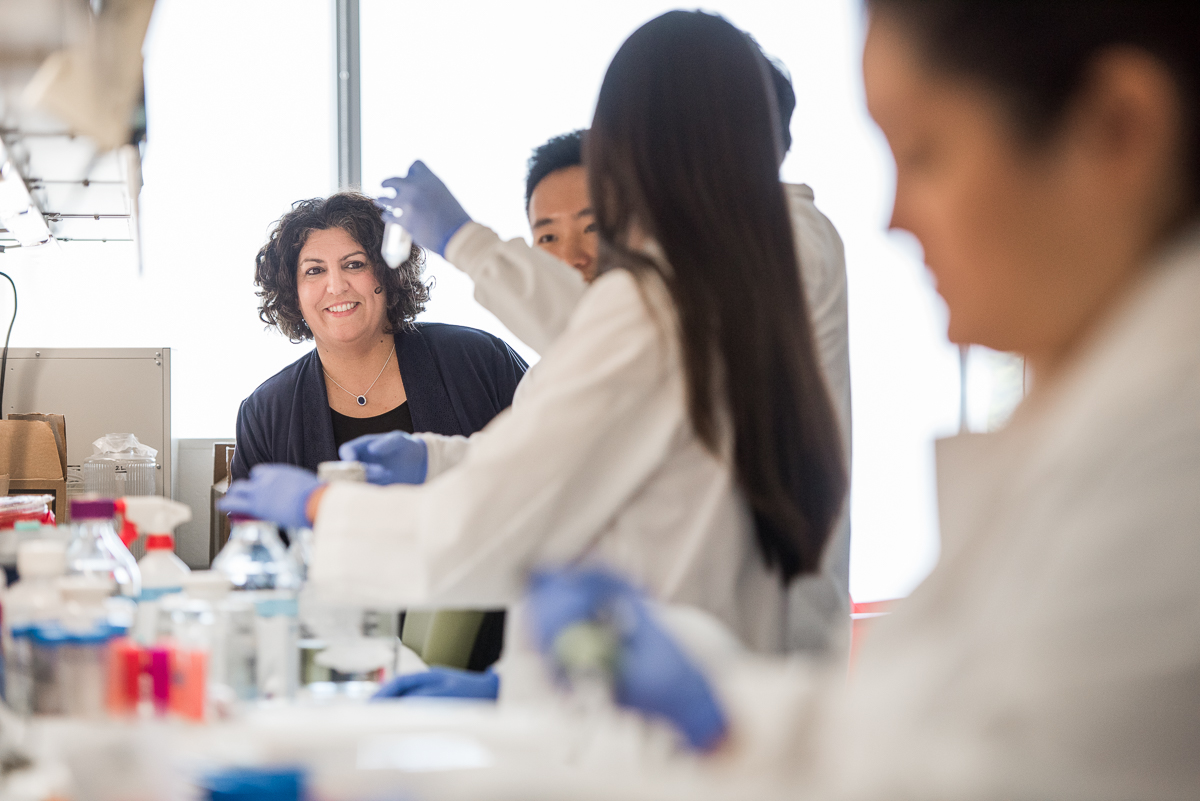
When Francesca Mariani learned that she would receive USC’s highest honor for outstanding teaching, a 2023 Associates Award for Excellence in Teaching, it took her by surprise.
“Sometimes it feels mysterious as to why I should be getting this award,” said Mariani, an associate professor of stem cell biology and regenerative medicine, and integrative anatomical sciences at USC. On the other hand, she thinks, “Maybe it’s because I just do it naturally. I enjoy it, and I don’t even realize that I do it.”
Mariani serves as the faculty director of USC’s first-of-its-kind master’s program in stem cell biology and regenerative medicine. She teaches courses for master’s, PhD, and MD students at the Keck School of Medicine of USC, and mentors students and trainees from the high school to postdoctoral levels who pursue research opportunities in her lab. In addition, she serves as the co-director of the new USC CIRM COMPASS Scholars Program, which will prepare undergraduate students for careers in stem cell biology and regenerative medicine starting this summer.
“Dr. Mariani is well-known for fostering an inclusive environment that enhances the learning of everyone in her classes,” said Peggy Farnham, the vice dean for health and biomedical science education at the Keck School. “She also puts great effort into serving as a wonderful mentor to younger faculty who are just beginning their teaching careers. When speaking of Dr. Mariani, the phrase ‘she goes above and beyond all that is required of her’ is heard time and again from students and faculty.”
In 2021, Mariani was also the recipient of the teaching award for the Department of Stem Cell and Regenerative Medicine.
“Francesca Mariani has contributed so much to the stem cell department, the Keck School, and USC as a whole through her gifts as a teacher and a mentor,” said Andy McMahon, chair of the Department of Stem Cell Biology and Regenerative Medicine. “And of course, the true testament to her talents is the success of the students she has inspired as a leader of our education and training efforts at all levels.”
USC alumnus Max Serowoky, who now works at the biotech company 10x Genomics, considers himself lucky to have joined the Mariani Lab as a PhD student. As he faced the inherent stresses of graduate school, he was relieved to know that Mariani always had his back.
“She supports her trainees unconditionally, which is so important to a budding scientist when things go wrong in the lab,” said Serowoky. “Our value and self-worth was not contingent upon our success in the lab, which allowed us to establish our own personal goals in an authentic way that set us up for long-term success. It may sound cliché or even provocative, but she genuinely prioritizes our success as people over our success as scientists. This attitude permeates everything she does and serves as a huge asset to the stem cell department and USC more broadly.”
Kerrigan Kilpatrick, an alumna of the stem cell master’s program at USC, credits her experience in the Mariani Lab with preparing her to enter the PhD program at the University of Tokyo.
“Dr. Mariani met with me frequently to advise on my project and studies, and upon learning that I was interested in conducting research over the summer but was experiencing financial hardships, she assisted me to find and acquire a scholarship for my research,” said Kilpatrick. “She transcends what is expected of a professor, actively reaching out to students, getting to know their ambitions, and doing all within her power to help them follow their dreams. To me, Dr. Mariani will always be the standard for what the most elite professor should be, the kind of professor I aspire to be.”
Mariani’s teaching philosophy is to allow students to pursue their own interests. In her lab, this means encouraging students to pick their own research projects and strategizing with them about how to achieve their goals—even if these goals shift away from a career in research.
“I tell them, ‘I want you to figure out what you want to do in your life. Just come talk to me. I’m not going to feel offended if you decide that doing research is not for you.’ So I think that that that helps the students in my group, because they know that my role is to facilitate what their goals are,” said Mariani.
Similarly, in the classroom, she gives students an opportunity to think about an array of topics, rather than imposing a requirement to memorize a slew of facts.
She also incorporates active learning techniques into her teaching, so students aren’t passively listening to lectures, but actively engaging in a back-and-forth process that reinforces their learning. For example, when she teaches about the stage of embryonic development known as gastrulation, she describes it in words, shows pictures and videos, and then hands out clay so the students can model the process with their own hands.
Mariani never feels like helping her students is a burden, and her office is filled with gifts and cards expressing gratitude for the impact she’s made on their lives.
“Students come by to express their appreciation,” she said. “Then they say, ‘Oh, we met a few months ago, and I’m so grateful for all the time you gave to me to talk to me about my life or my problem or my career.’ And I am surprised, as we only met once, for a short time. It just goes to show that it doesn’t take that much effort to make an impact on somebody. Just listening and trying to help them navigate their life and their world can have a profound impact, even though from my perspective, it was, you know, only half an hour.”
